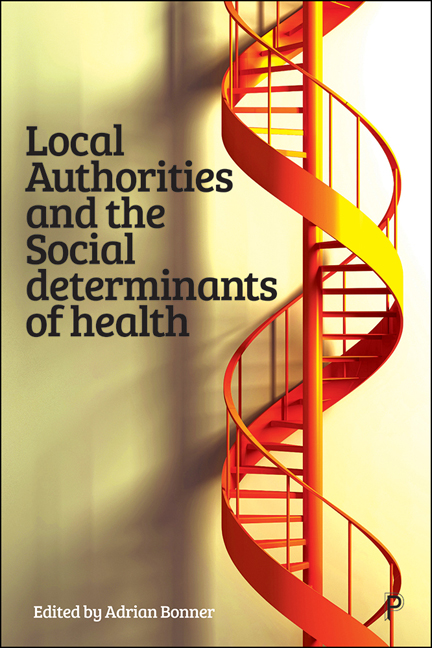Book contents
- Frontmatter
- Dedication
- Contents
- List of Figures, Tables and Boxes
- Notes on Contributors
- Acknowledgements
- Foreword
- Summary
- Introduction: Key Sociopolitical Changes Affecting the Health and Wellbeing of People
- Part I Health, Social Care and Community Wellbeing
- Part II The Role of Local Authorities in Promoting Health and Wellbeing in the Community
- Part III Local Authority Commissioning
- Part IV The Third Sector
- Part V Socio-Economic Political Perspectives
- Conclusion
- Appendix: COVID-19 Timeline
- Index
6 - A Place-Based Approach to Healthy, Happy Lives
Published online by Cambridge University Press: 25 March 2021
- Frontmatter
- Dedication
- Contents
- List of Figures, Tables and Boxes
- Notes on Contributors
- Acknowledgements
- Foreword
- Summary
- Introduction: Key Sociopolitical Changes Affecting the Health and Wellbeing of People
- Part I Health, Social Care and Community Wellbeing
- Part II The Role of Local Authorities in Promoting Health and Wellbeing in the Community
- Part III Local Authority Commissioning
- Part IV The Third Sector
- Part V Socio-Economic Political Perspectives
- Conclusion
- Appendix: COVID-19 Timeline
- Index
Summary
Introduction
The London Borough of Sutton, in south-west London, has had stable political leadership for the last 34 years. During this time, the population has become increasingly diverse and continues to grow. The last ten years of reduced central government funding have resulted in budgetary planning that has presented many challenges. In this chapter, Ruth Dombey, leader of the council, outlines innovative approaches to maintain a healthy, happy and safe community. Place-based approaches, involving integrated health and social care integration and outcome commissioning, have been developed with a view to a consideration of ‘health’ in all council planning.
I was standing in a queue at my local pharmacy, listening to the pharmacist chatting to the elderly man in front of me while she made up his prescription. She clearly knew him well and he felt at ease with her. I noticed much of the conversation revolved around his wife and her health – and understood why when it transpired that he was the carer for his wife and was getting up several times during the night to see to her needs. His physical and mental exhaustion was due to his caring responsibilities and the wider context of his life. The pharmacist understood that and was able to give him useful advice. (Ruth Dombey)
So often, people are categorised by their specific needs and problems. What is your housing need, your medical need, your financial need? What can I do to help you with that one aspect of your life? What services can I offer to help you address that particular need? But life is not linear – it is messy and complicated and interconnected. What if we were to ask what you would like in order to lead an active, healthy and happy life?
People are not just patients, service users, passive recipients of public services. People have a right to a say in their own lives, a right to be involved in decisions that affect everyone and a right to decide their own priorities. We have a responsibility to be active citizens of the world we live in and help to shape that world for the better. We are bound by one common factor – the place where we live. It may not be the place where we work or study or even where we spend most of our time.
- Type
- Chapter
- Information
- Local Authorities and the Social Determinants of Health , pp. 105 - 120Publisher: Bristol University PressPrint publication year: 2020



